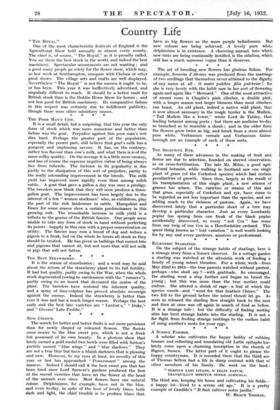THE POOR MAN'S Cow.
It is a small detail, but a surprising, that this year the only form of stock which was more numerous and better than before was the goat. Prejudice against this poor man's cow dies hard. Perhaps the greater part of the population, especially the poorer part, still believe that goat's milk has a pungent and unpleasing savour. It has, on the contrary, rather less flavour than cow's milk, and what there is is of the same milky quality. On the average it is a little more creamy, and has of course the supreme negative virtue of being always free from tubercle. The increase in its popularity is due partly to the dissipation of this sort of prejudice, partly to the really astounding improvement in the breeds. The milk yield has improved more rapidly even than among milch cattle. A goat that gave a gallon a day was once a prodigy. The breeders now think that they will soon produce a three- gallon goat. The improvement has been largely due to the interest of a few " women stockmen" who, as exhibitors, play the part of the rich landowner in cattle. Hampshire and Essex for some reason show a certain predominance in this growing cult. The remarkable increase in milk yield is a tribute to the genius of the British fancier. Our people seem unable to take any form of stock in hand without perfecting its points—happily in this case with a proper concentration on utility. The fancier may ruin a breed of dog and reduce a pigeon to a freak, but on the whole he treats all stock as they should be treated. He has given us bulldogs that cannot bite and pigeons that cannot sit, but not cows that will not milk or pigs that will not fatten.


































 Previous page
Previous page